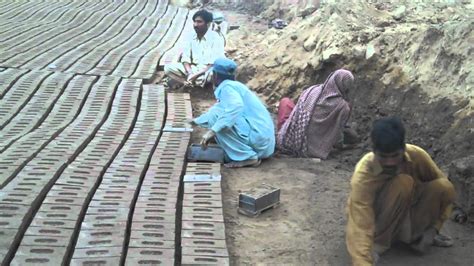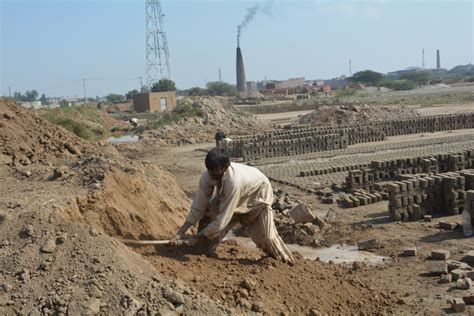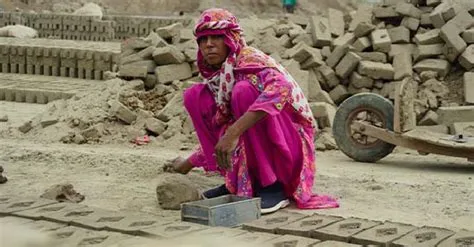Eighteen-year-old Rawal Masih toiled at a brick kiln, a place of hard labor and relentless heat. On the fateful night of April 17th, while he was feeding coal into the furnace, tragedy struck. The cover of a manhole gave way, and Rawal plummeted into the roaring blast furnace.
According to Rescue 1122, the devastating accident occurred just past midnight. Despite their swift response, arriving within minutes, they found Rawal’s body already consumed by the inferno. Mohammad Zahid, a spokesperson for Rescue 1122, said that the flames in the furnace reached several feet high, making any immediate rescue impossible.
This harrowing incident took place in Chak 225 RB Malkhanwala, a suburb of Faisalabad. Rawal’s father, fifty-year-old Khurshid Masih, now bears the heavy burden of being the sole provider for his family, which includes his wife and three young children. The loss of his son has plunged the family into profound grief and hardship.
Khurshid Masih expressed his relentless struggle for justice, tirelessly seeking accountability from those responsible for his son’s tragic death. His words echo the pain and determination of a father fighting against the odds, refusing to let his son’s death be in vain.
“The death of my young son broke my back. Now, there is no food in the house, and we are on the brink of starvation,” lamented Khurshid Masih, reflecting the profound despair that has engulfed his family.
When Khurshid went to the mortuary to collect his son’s body, he was subjected to an unimaginable ordeal. He was coerced into placing his thumbprints on simple documents before they handed over his son’s charred remains, effectively stripping him of the right to seek legal recourse against those responsible for the accident.
“I’m exhausted from my futile visits to the labor department. No one listens. Maybe they don’t see us as humans. To them, we’re insects whose lives and deaths are insignificant,” Khurshid said, his voice tinged with both weariness and indignation.
Labor organizations have staged protests in front of the Labor Department, demanding financial assistance for Rawal Masih’s family and the implementation of safety measures at brick kilns. Despite these efforts, progress has been elusive.
Baba Abdul Latif, President of the Labor Qaumi Movement, said that he has held several meetings with Director Labor East Syed Ghazanfar Ali Shah, advocating for compensation for Rawal’s family. However, the Labor Department has yet to fulfill its duty.
“The kiln workers in Chak 225 RB are forced to work in conditions worse than slavery,” Latif stated, highlighting the dire circumstances that these laborers endure daily. The fight for justice and better working conditions continues, but the path remains fraught with challenges and resistance.
“This area has become a no-go zone for labor and human rights organizations. Kiln workers are forced to endure the lowest wages and are denied the fundamental right to unionize,” said Baba Abdul Latif with palpable frustration. He alleged that the Labor Department, Social Security Department, and the District Vigilance Committee, led by the Deputy Commissioner, are complicit in this neglect, doing nothing for the kiln workers beyond producing fraudulent reports.
According to Latif, this tragic incident is far from isolated. “This is not the first time workers have been killed or injured due to the lack of safety measures at brick kilns. In the last month alone, four lives have been lost, including two children of a kiln worker who were crushed by the mud collected for making bricks,” he recounted, his voice heavy with sorrow.
Despite these fatalities, there has been a glaring lack of accountability and action. “The police have yet to take any legal action regarding these accidents. Neither the kiln owners nor the labor department has made any effort to provide financial support to the affected families,” Latif stated, highlighting the systemic neglect.
Although the brick kiln business has been around for centuries, it remains entrenched in the informal sector in Pakistan. The Punjab Labor Department has yet to establish any safety guidelines or regulations to protect kiln workers. Furthermore, inspections of kilns do not include checks for safety measures, leaving workers in constant danger.
The fight for justice and safety for kiln workers is ongoing, but the journey is marred by bureaucratic apathy and resistance, underscoring the urgent need for comprehensive labor reforms and enforcement of safety standards.
The role of the Labor Department is narrowly confined to monitoring child labor and addressing health issues faced by workers, leaving many critical aspects of worker safety and welfare unaddressed.

A survey conducted by the Sustainable Development Institute revealed that 72 percent of kiln workers believe working conditions at brick kilns are not monitored by any government or non-governmental organization. Moreover, 87 percent of respondents demanded significant improvements in working conditions, and 61 percent emphasized the urgent need for health-related facilities.
In a comprehensive survey conducted by the Federal Ministry of Environment, the Punjab Government, the Kiln Owners Association, and other organizations, it was highlighted that despite the severe occupational hazards in brick kilns, most workers are deprived of essential safety measures and equipment.
According to the survey, workers responsible for feeding coal into the furnace face the highest risk of burns, cuts, and injuries, as well as exposure to fire, smoke, and dust due to extreme temperatures. The report underscores the necessity of providing masks, protective gloves, shoes, goggles, and helmets to these workers.
The findings call for an urgent overhaul of current practices to ensure that kiln workers are protected from the inherent dangers of their work environment. This situation demands immediate action from authorities and stakeholders to implement and enforce comprehensive safety regulations.
The lack of protective clothing significantly increases the likelihood of respiratory diseases among kiln workers, who are directly exposed to toxic fumes from coal, substandard fuels, and pervasive dust.
On the issue of compensation for Rawal Masih’s family, Faisalabad Commissioner Yasir Arafat informed that a notice had been issued to the kiln owner under the Compensation Act of 1932, mandating a payment of five lakh rupees. “According to the law, a period of 30 days is set for the payment of compensation. If the compensation is not paid within this period, the case will be escalated to the Deputy Commissioner, who will then ensure the payment is made,” Commissioner Arafat explained.
This situation highlights the urgent need for stricter enforcement of safety measures and regulatory oversight to protect the health and lives of kiln workers, along with prompt and just compensation for those affected by industrial accidents.
When questioned about legal action against the kiln owner responsible for the accident, Police Spokesman Malik Shahid said that typically, victims or their heirs are pressured to sign written statements agreeing not to pursue legal action in exchange for compensation from the kiln owners. Consequently, the police file these incidents as accidental and close the case.
However, Shahid noted that if Rawal Masih’s family or other laborers’ heirs wish to pursue legal action against the kiln owner, they can still file an application at the relevant police station. A case would then be registered under Section 322 of the Pakistan Penal Code, obligating the accused to pay compensation to the deceased’s heirs.
In addition to accidents stemming from inadequate safety measures, brick kiln workers suffer from the denial of minimum wages, social security, and basic human rights protections.
Naziran Bibi, a 50-year-old worker at a kiln a few kilometers from the Faisalabad bypass, shared her family’s struggles. “My family of five has been making bricks for decades. When we start at one in the morning, our children are with us. We worry about snakes and insect bites in the dark, but we have no choice but to work,” she said.
Her family produces about 1,000 to 1,200 bricks in 12 hours, for which they are paid just Rs. 1.5 per brick. This meager compensation underscores the harsh realities faced by kiln workers, who labor under dangerous conditions without adequate pay or protections.
This situation highlights the urgent need for comprehensive labor reforms, stricter enforcement of safety regulations, and the protection of workers’ rights to ensure a dignified and safe working environment.
“It is very difficult to survive on this income. We often have to borrow money from the kiln owner to meet household expenses, and the debt only keeps growing,” said Naziran Bibi, highlighting the vicious cycle of poverty and debt that entraps kiln workers.
She explained that if a kiln worker falls ill, they have no option for leave since they work on daily wages and most lack social security cards. According to Naziran Bibi, the inhumane behavior of kiln owners is evident in their attitudes toward the workers. “When workers go to collect their weekly wages, the owner sits on a cot while the workers are made to sit on the ground,” she recounted.
This practice, she said, is a deliberate attempt to humiliate workers and instill fear, ensuring they remain submissive and do not speak out against their exploitation.
A survey by the Sustainable Development Institute corroborates these hardships, revealing that most kiln workers are trapped in their jobs by debt. According to the survey, only 16 percent of kiln workers have written contracts, and they typically work for 11 to 13 hours a day. Aside from access to drinking water, there are no other facilities available at the workplace.

The survey also found that 16 percent of workers reported harassment and the beating of children, while women workers highlighted the severe difficulties they face due to the absence of latrines at the workplace.
These conditions underscore the urgent need for comprehensive reforms to protect the rights of kiln workers, ensure fair wages, provide social security, and establish a safe and respectful working environment. The plight of these workers calls for immediate attention and action from authorities and human rights organizations to end this cycle of exploitation and abuse.
According to a 2020 report by the United Nations Office on Drugs and Crime (UNODC), forced labor is most prevalent in brick kilns, agriculture, and domestic work. A survey jointly conducted by the Federal Ministry of Environment, the Punjab Government, and the Association of Kiln Owners found that there are over 20,000 brick kilns in Pakistan, with 52 percent located in Punjab province, and nearly 100,000 kiln workers in total.
Walk Free’s Global Slavery Index 2023 ranks Pakistan as the 18th country in the world, and the fourth in Asia, with the highest number of people living in conditions of modern slavery.
Mian Farman Ali, the Faisalabad representative of the Kiln Owners Association, said that the provision of safety equipment and other facilities to protect workers at the kilns is at the discretion of individual kiln owners. “The association urges all members to improve working conditions and to pay prompt compensation to workers in case of accidents, as required by law,” he stated.
Ali also mentioned that the Kiln Owners Association has repeatedly petitioned the government to grant industry status to brick kilns. This designation would provide legal protection to both kiln owners and workers, ensuring better working conditions and formal recognition of their rights and obligations.
The dire situation highlighted by these reports and surveys calls for immediate and decisive action to address the exploitation and unsafe conditions faced by kiln workers. It underscores the need for stringent enforcement of labor laws, improved safety regulations, and the formalization of the brick kiln industry to safeguard the rights and well-being of its workers.
He stated that the lack of clear regulations has led government officials to use kiln owners as a source of bribes, enabling these owners to exploit their workers with impunity.
In February 2020, the Lahore High Court directed the Provincial Department of Labor and Human Resources to complete the registration of all brick kilns in the province under the Factories Act, 1934 within six months. This move aimed to formally register and regulate the brick kiln industry. However, this directive remains unimplemented.
A survey jointly conducted by the Federal Ministry of Environment, the Punjab Government, and the Kiln Owners Association recommended that the government officially recognize brick kilns as an industry to regulate the sector effectively. This recognition would not only allow kiln owners to benefit from industrial concessions but also ensure the safety and protection of kiln workers’ fundamental rights.
The report also highlighted that the traditional design and construction of brick kilns are typically carried out by ordinary masons rather than trained engineers. This often results in structural weaknesses, such as cracks and heat leakage, leading to accidents. Workers like Rawal Masih lose their lives due to these unsafe conditions. The report calls for legislation to standardize the design, construction standards, and temperature maintenance methods of brick kilns to prevent such tragedies.
These measures are crucial, especially considering that the number of brick kilns has doubled over the last three decades, with a corresponding increase in the number of kiln workers and the frequency of accidents.
Implementing these reforms would provide a safer and more equitable working environment for kiln workers, ensuring their rights are protected and reducing the risk of fatal accidents. The time for decisive action is now, to safeguard the lives and well-being of those who toil in this hazardous industry.
